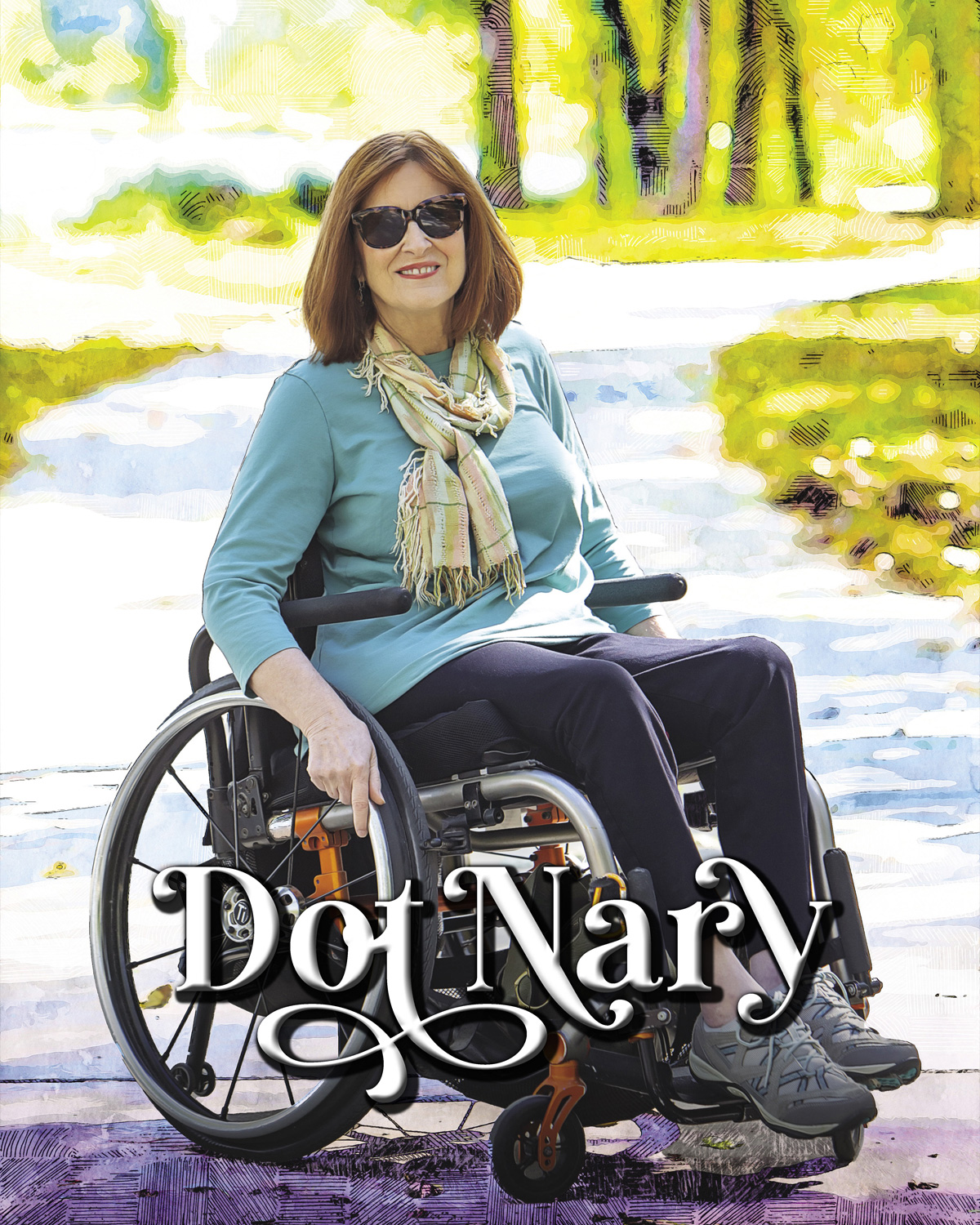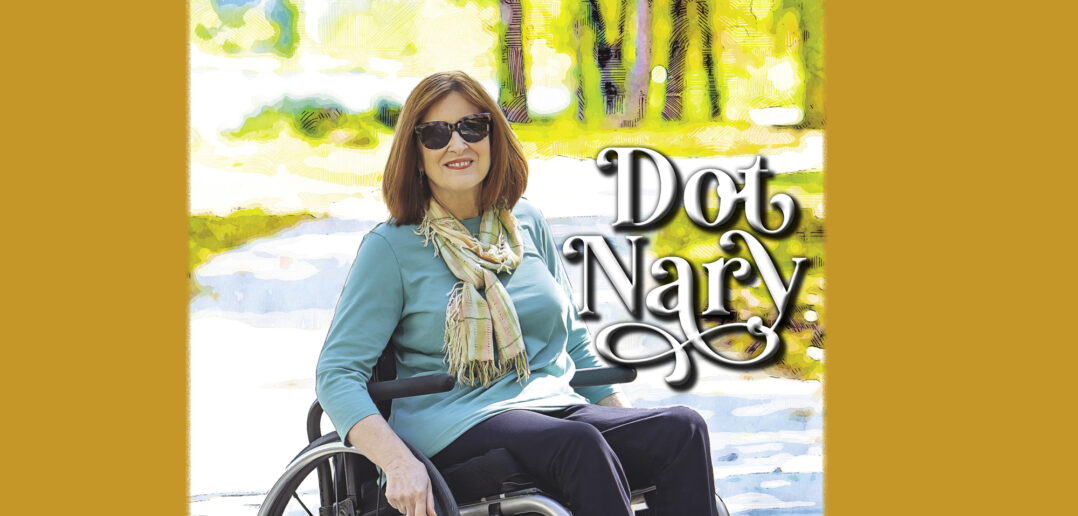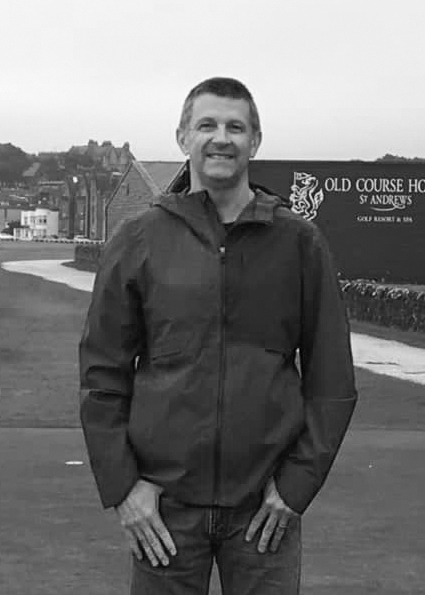| story by | |
| photo by | Steven Hertzog |
| OPEN A PDF OF THE ARTICLE |
An activist for people with disabilities, Dot Nary works to eliminate disparities in housing, health care, transportation and recreation, and create a more inclusive community so the disabled can thrive in a society that often rejects them.

Dot Nary: Woman of Impact
The way Dot Nary sees it, her tireless work over the last three decades advocating for the rights and collective dignity of disabled people was inevitable.
“Activism was part of the work,” says Nary, who’s used a wheelchair the last 30 years because of a congenital condition. “I worked in several (independent living centers) in New York in the 1990s, and becoming active and an advocate for disabled people came along with that.”
Nary brought her work and activism to Lawrence in the late ’90s, taking an opportunity to complete graduate work at the University of Kansas (KU). And the local disabled community has been the better for it ever since.
Soon after arriving, she served on the board of directors for Independence Inc., an independent living center in Lawrence with a mission of maximizing independence among people with disabilities through advocacy, peer support, training, transportation and community education. When she wasn’t working with local government on issues of acceptance of disabled people as contributing members of the community or access of various buildings and businesses throughout town, she was involved with research on health-care accessibility and quality of life for disabled people, and eliminating health disparities as an assistant research professor at KU’s Research and Training Center (RTC) on Independent Living, a role she retired from last December.
“Dot has always had a great sense of justice,” says Martha Hodgesmith, J.D., a retired lawyer who worked with Nary for 15 years at the RTC. “It’s personal for her, but in a way that translates into advocacy and research. Live life as full as you can, then layer academics and career, and it leads to advocacy.
“Dot has a real commitment that the health industrial complex meets the needs of all for all ages. With the (COVID-19) pandemic, her advocacy is even more important, because long COVID has brought home the impact of long-term disabilities.”
Finding Freedom
Nary grew up the youngest of four children in Pawtucket, Rhode Island. She was born with spina bifida, a birth defect in the spinal column that, while not progressive itself, can be accompanied by conditions that can lead to limitations with mobility and function.
She walked and had few limitations through her preteen and teen years, but as she approached her 20s, she found getting around more and more difficult. She enrolled at Emmanuel College, in Boston, but dropped out her first year because she was having trouble walking.
“I progressed to braces, then crutches,” says Nary, who finished undergraduate work at Rhode Island College, in Providence. “My 20s were very difficult. I was falling all the time, and I had to have toes amputated.”
A turning point, she says, occurred when she discovered a movement that encouraged her to use a wheelchair without feeling inadequate or bad about herself.
“Getting into a chair represented freedom to me,” Nary says. “I got to meet role models who were in wheelchairs. My role models up to that time were people in nursing homes or Jill Kinmont, an Olympic skier who was left paralyzed from a skiing accident.”
“I got married at 30, lived in upstate New York. I started working with my peers in the disabled community and met others who were dealing with what I was going through, and it was life-changing,” she explains.
Nary became further involved in political issues involving disability rights. She remembers traveling to Washington, D.C., and not being able to get into her congressman’s office because it wasn’t wheelchair accessible, she says.
Eventually, she played a role in the advocating for the Americans with Disabilities Act (ADA), a 1990 landmark civil rights legislation prohibiting discrimination based on disability.
“I was invited to attend the signing in the White House Rose Garden but couldn’t go because I was having surgery,” she says.
In 1996, Nary and her husband, Norm White, also disabled, made the huge decision to uproot from their East Coast roots and move to the middle of the country.
“I had the opportunity to work with an advisor in disability research here at KU,” says Nary, who achieved a master’s degree and Ph.D. from the University in human development and child psychology. White worked at several independent living centers and then for the State of Kansas at both the Kansas Department of Health and Environment and the Department for Children and Families. He’s also recently retired.
Nary spent the last 25 years working mostly in research at KU’s RTC on Independent Living, learning ways and means to eliminate health disparities, increase independent living opportunities for persons with disabilities, teach advocacy skills and transform the Lawrence community for the better. She also taught as an adjunct professor at Rockhurst University, in Kansas City, and Washburn, in Topeka. She’s had numerous papers published in academic journals.
Points of Emphasis
One of Nary’s most recent projects was a collaboration with the Lawrence Parks and Recreation Department and other key partners to create awareness of trails in the Lawrence area that are most “inviting” for people with mobility impairments and disabilities.
“We created a map of the (Lawrence) Loop to show the most accessible routes,” she says.
“Dot is respected by community members for her subject matter expertise on accessibility, her ability to work well with people and to find workable solutions to complex problems, and for her passion for making our community a better place to live for everyone regardless of their identities and abilities,” says Chris Tilden, who’s worked with Nary on many various workgroups and coalitions in town. “She is tireless and has made so many contributions to this community that it is hard to count.”
Nary says she has several points of emphasis she likes to focus on in her work. It’s estimated one in four persons experience a disability of some sort, and most will experience some form of disability—temporary or permanent—at some point in their lives. Disability is a broad term, she says, making the disabled community very diverse. And the disability movement is a rights movement not focused on limitations. Issues such as employment (employment rates for disabled people hover around 19 percent, Nary says), housing, health care, transportation, recreation—all need to be more inclusive.
Nary says she’s found, both through personal experience and through her research and collaborating with other disabled people, that they are very resourceful and can thrive in a society that often rejects disability.
“Having a disability has enhanced my life in many ways,” she explains. “It’s shown me the need to be resilient and the need to advocate. I committed to working in Lawrence to make it accessible to everyone.
“People tend to get beaten down, and I refuse to be beaten down,” she says.





